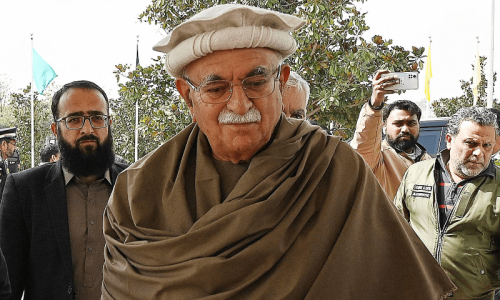A trip to Quetta has yielded a familiar set of talking points on Balochistan. On Monday, army chief Gen Qamar Bajwa in a series of public events reiterated the mantra of strength and development in Balochistan — and held out a perfunctory olive branch to Baloch separatists while warning the presumably foreign enemies of the country who seek to destabilise the province.
By itself, the message was seemingly comprehensive and coherent. But in the context of a long-simmering, low-level insurgency and a province wracked by all manner of other violence, an opportunity to expedite the peace process in the province has been missed. If anything, the familiar, military line on the province gives the impression that it is likely to be business as usual in Balochistan.
Earlier, when Baloch activist Wahid Baloch was released soon after Gen Bajwa assumed office, it had appeared there was a possibility of a fresh look at the Balochistan policy. But thanks to the centre’s inability to come up with a political solution, Gen Bajwa’s comments suggest that the Baloch issue is still being seen from a security perspective.
Yet, for all the attempts to try and reinforce the status quo in the restive province, it has been clear for many years that a more-of-the-same approach will not work. At its core, the Baloch insurgency is a political issue.
While entwined with developmental concerns, the imposition by the federation and the military establishment of a top-down solution to localised problems will simply not work. And although Balochistan does have an elected assembly comprising the province’s political mainstream, Baloch dissidents and their leaders can only be wooed if the elected representatives are given real autonomy and negotiating powers.
The continuing failure to include Baloch dissidents in political dialogue realistically has also something to do with the stubbornness and politically uncompromising view of separatist factions. Nevertheless, the unquestionably dominant power in the province is the state apparatus and as such it is the responsibility of state actors to pursue dialogue wherever possible — and where currently not possible, to use peaceful means to create the conditions for dialogue.
Finally, there is the growing question of a securitised view of development. With dismal socioeconomic indicators, Balochistan desperately needs an injection of job-creating business opportunities.
The investments under CPEC could change the destiny of parts of the province. However, the state-led version of investment and business opportunities threatens to install in Balochistan an economy that is not only overseen through policy directives by state and security officials but where projects, assets and businesses themselves are owned and controlled by the state.
The future implications in a province that has long resisted outside dominance could be dire. If CPEC is truly to benefit Balochistan, it must be owned by the Baloch and Balochistan.
Published in Dawn December 28th, 2016















































